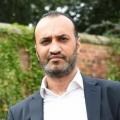
A brother and sister who were brought up in Blackburn are conducting pioneering research which aims to use AI to boost IVF success rates.
Mo Vali from the Department of Physics at the University of Cambridge and Dr Saaliha Vali from the Lister Fertility Clinic, Imperial College London were invited to Oman to deliver presentations on the subject.
They are conducting the cutting-edge collaboration alongside Dr Staci Weiss, from the Department of Psychology at the University of Cambridge.
This week they joined some of the leading medical professionals in the world at the RCOG (Royal College of Obs & Gynaecology) World Congress in Muscat.
The RCOG’s flagship event in 2024 offers professionals from around the world the opportunity to learn about the latest developments in a variety of specialties over three days.
Earlier this summer the team told AI@Cam they were responding ‘to a birth rates crisis, exacerbated by poor birth outcomes for couples who are finding it difficult to have children’.
In many advanced economies, the global fertility rate has more than halved over the past 50 years from about five children per woman to 2.1 today.
This trend is said to be particularly worrying in places like South Korea, where the rate is 0.72 children per female (0.55 in Seoul), meaning the population is expected to fall by 60% in 70 years. In the UK, the fertility rate was 1.49 last year, and is predicted to fall to 1.38 in the next 20 years.

Mo Vali told the site: “I’m a physicist, interested in exploring fundamental questions.
"Most IVF innovations have been commercially led, tinkering around the edges and trying to make technical improvements to the IVF process.
“However, there’s a lot of unexplored territory, with open questions about the underlying molecular mechanisms of life.
"We still don’t really know the underlying mechanisms for how life takes shape, and we hope to put the science on a more rigorous footing – improving outcomes, reducing misinformation and exploring some of these fundamental questions.”
In August last year, Dr Saaliha was part of the ground-breaking team that successfully performed the first ever womb transplant in the UK.
The ‘medical milestone’ offers new hope not only to young girls born without a womb but also others who may have had their uterus removed due to illness.
Speaking of her latest research Saaliha said: “As an Obstetrics and Gynaecology doctor, I’ve spent considerable time with women experiencing unexplained infertility.
"I was shocked at how inefficient the IVF process is and felt that, with all the technology around us, we should be using cutting-edge developments in healthcare.
“I was always quite excited about AI, but as a clinician, I lacked the skill set to take it any further. Talking to my brother Mo, who is doing a PhD in physics and machine learning, I started discussing these ideas, leading to this cross-fertilisation between myself as a fertility doctor and scientists like Staci and Mo.”



Comments: Our rules
We want our comments to be a lively and valuable part of our community - a place where readers can debate and engage with the most important local issues. The ability to comment on our stories is a privilege, not a right, however, and that privilege may be withdrawn if it is abused or misused.
Please report any comments that break our rules.
Read the rules hereLast Updated:
Report this comment Cancel